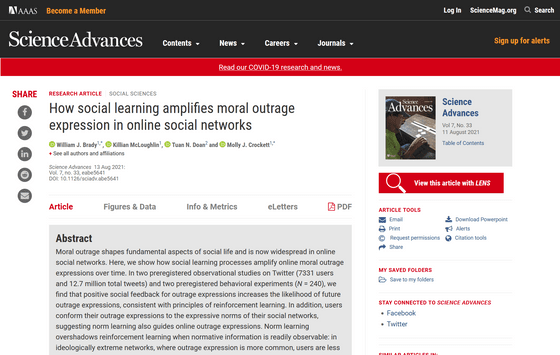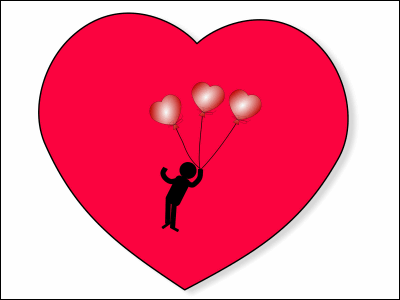Research results show that anger posts intensify for those who like anger posts

SNS like Twitter can show reaction to a post by 'Like' or 'Share' in addition to personal text exchange. Studies have shown that such reactions are perceived as 'rewards' for users, and that some users may intensify their postings for 'rewards.'
How social learning amplifierifies moral outrage expression in online social networks | Science Advances

'Likes' and'shares' teach people to express more outrage online
William Bredy and colleagues at Yale University will follow up on subsequent posts by users who have expressed 'anger' in their Twitter posts. We created machine learning software that can track 'anger' and analyzed 7331 Twitter users and about 12.7 million tweets to study how 'anger' they showed over time. The software used to identify posts based on specific words, capital letters, exclamation marks, and so on.
As Breedy and his colleagues pursue their research, they discover that daily 'anger' posts are significantly associated with reactions from other users. In addition, users who received a lot of 'likes' and 'retweets' from posts that expressed 'anger' felt 'rewarded' by expressing 'anger' and expressed 'anger' in later posts. I also found that I was more likely to do it.

For example, it turns out that users who get 'likes' or 'retweets' twice as much as normal posts for posts that express 'anger' will increase the number of posts that express 'anger' by 2-3% in later posts. Did. 'It's a small number, but the number of' likes 'and' retweets 'to' anger 'can increase dramatically, and users get attention and maintain relationships. It may increase the number of'angry'posts because of this. '
It was also found that politically moderate people were 'more influenced by their surroundings', although there were fewer posts expressing 'anger' than politically extremist people. .. Moderate people were more likely to express 'anger' if many of the people around them who had a relationship were those who expressed 'anger.'
'We say that SNS provides a neutral platform, but it's clear that the SNS mechanism is a structure that amplifies'anger',' Breddy and colleagues said.

'Technology companies should be aware that platform design'influences the outcome of the collective movement'.'Angry' makes a decisive social and political change,' Breddy and colleagues said. Said.
Related Posts:
in Web Service, Posted by log1p_kr







